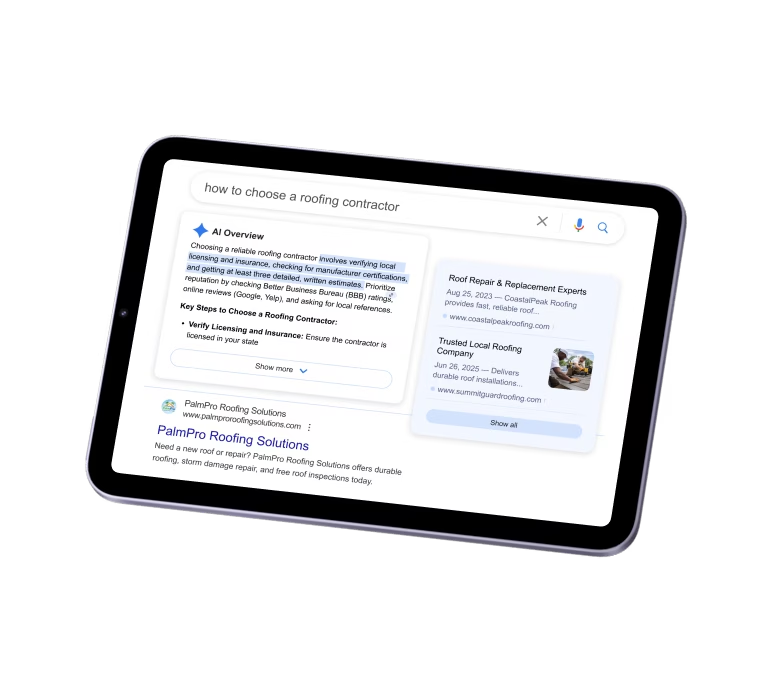1. Comrade Digital Marketing Agency

- Assisted a client in achieving a 375% increase in qualified leads.
- Helped a client enhance their eCommerce website conversion rate by 174%.
- Comrade is a partner of industry giants, such as Google, Shopify, and HubSpot.
- Garnered the esteemed accolade of “Top SEO Agency” by UpCity.
Comrade Digital Marketing is a distinguished, full-service digital marketing agency. Our seasoned team offers a plethora of high-quality services, including SEO, local SEO, AI search optimization (Generative Engine Optimization), web design, content, and social media marketing.
We are a Google Premier Partner agency, and we pride ourselves on our data-driven approach to SEO, continuously updating strategies according to the latest trends. We meticulously track results, ensuring the best outcomes for our clients, as demonstrated by our extensive portfolio and numerous successful case studies.
Our team’s dedication to excellence is reflected in our impressive ratings on sites like Google and Clutch, with over 300 satisfied clients. We serve firms across the USA, from local businesses to national brands, and have cemented our reputation as a trusted partner for businesses seeking superior digital marketing solutions. Our commitment to delivering exceptional results makes us stand out in the sea of SEO agencies.
2. SEO Inc.

- They boast a 4.5 out of 5-star rating on Google based on 17 reviews, highlighting the consistently high level of customer satisfaction.
- Based in Nashville, Tennessee, SEO Inc. extends its top-notch services to clients across North America.
- With their unwavering commitment to excellence, SEO Inc. is dedicated to helping your business succeed in the highly competitive digital landscape.
SEO Inc. is a versatile, trusted SEO service provider offering a wide array of services tailored to your diverse needs. They specialize in comprehensive keyword research and analysis, ensuring thorough website optimization. Their on-page strategies ensure your website meets all the technical requirements for optimal search engine performance.
Their proficiency in off-page optimization techniques helps build a robust online presence for your business. They employ strategic link-building and extensive technical SEO expertise to boost your site’s visibility and search engine indexing. Blending creativity and data-driven insights, they produce impactful content that connects with your target audience.
With a team of certified professionals committed to continuous learning and industry best practices, SEO Inc. ensures your SEO strategy aligns with the latest algorithms and trends. They meticulously track and measure results, providing transparent insights and guaranteeing optimal outcomes for their clients.
3. Victorious SEO

- Victorious SEO have a team of 50+ experts.
- Businesses of all sizes, ranging from startups to Fortune 500 companies, are among their clients.
- They offer a free consultation to help businesses understand their SEO needs and goals.
Victorious SEO is a distinguished internet marketing agency renowned for its expertise in enterprise-level SEO. Awarded the “Best Large Agency of 2022” at the US Agency Awards, they boast a team of seasoned experts committed to delivering optimal results through a data-driven approach.
Their impressive portfolio features compelling case studies, including a 573% increase in organic traffic for Blink Health and a 291% surge in online revenue for Gema & Co. The Humane Society of the United States also experienced a 300% boost in website traffic under their guidance.
In essence, Victorious SEO has a proven track record in enhancing website visibility and search rankings, making them an excellent choice for businesses seeking a dedicated SEO partner.
4. HigherVisibility

- HigherVisibility was established in 2008 with a vision to excel in the digital marketing industry.
- Their team comprises more than 50 proficient professionals.
- HigherVisibility has earned the Best Full-Service SEO and SEM Agency award by Forbes.
HigherVisibility is a renowned, award-winning digital marketing agency based in Memphis, Tennessee, specializing in SEO, paid search, and social media advertising. Their dedicated team of professionals excels at helping businesses of all sizes succeed in the digital world.
They distinguish themselves with their commitment to client success, taking time for complimentary consultations to understand business needs and devise customized marketing plans accordingly.
With a proven success record, HigherVisibility has become a preferred choice for businesses aiming for growth in the digital realm. Trust them to drive your brand with comprehensive SEO strategies, targeted paid advertising campaigns, and potent social media advertising. HigherVisibility is the agency committed to ensuring your success.
5. Zupo

- Here’s their Google rating: 5.0 out of 5 stars (based on 50 reviews)
- They cater to a diverse clientele, serving businesses spanning various scales, ranging from budding startups to established small enterprises.
- Zupo provides businesses with a complimentary consultation to help them grasp their SEO requirements and objectives.
Zupo, a boutique SEO agency based in San Francisco, offers personalized services to clients, specializing in driving website traffic and boosting Google rankings. They offer comprehensive search engine optimization services aimed at enhancing your website’s visibility.
Their team of experts utilizes a meticulous data-driven approach to deliver impressive results. Notably, they excel in keyword research, optimizing your content for maximum impact. They also specialize in eCommerce SEO, optimizing your online store for customer attraction and conversion.
Zupo’s services extend to both on-page and off-page optimization, implementing strategies that boost your site’s performance and credibility. Their efforts are precisely tracked and measured, ensuring optimal outcomes from their campaigns.
6. Manta

- Highly rated and reviewed, Manta boasts a Google rating of 4.9 out of 5 stars based on 400 reviews, as well as a Clutch.co rating of 4.8 out of 5 stars based on 20 reviews.
- They focus on helping small businesses grow.
- Committed to customer satisfaction, Manta offers free consultations to help businesses understand their unique SEO needs and objectives.
Manta, a seasoned national SEO agency based in Lehi, Utah, offers a comprehensive range of services, including keyword research, on-page and off-page optimization, and technical SEO to bolster your online presence. Their meticulous, data-driven approach ensures optimal outcomes for clients, with results diligently tracked and measured.
With over 15 years of experience, Manta has a proven success record, making it a highly trusted choice for businesses looking to amplify their online visibility and website rankings. Their reach spans across the United States, delivering their exceptional services nationwide.
Partnering with Manta unlocks your online potential, leveraging their expertise, bespoke strategies, and dedication to client success. Trust Manta to elevate your digital presence.
7. Raven Creative

- Raven Creative is a marketing and creative agency based in Houston, Texas.
- They have been in business since 2012.
- Their main partners are the businesses from the middle segment.
Raven Creative, a comprehensive digital marketing agency, offers exceptional services in SEO, PPC, web design, social media marketing, and content creation. Their team of experienced professionals ensures your website’s optimization and organic traffic growth, utilizing the latest SEO practices and a data-driven approach.
As a recognized Google Partner, Raven Creative meets stringent standards for SEO excellence, demonstrating their credibility and expertise in web design and development. They ensure optimal outcomes by carefully tracking and measuring results, allowing for ongoing performance monitoring and adjustments.
Raven Creative is more than just an SEO agency. They are a reputable, results-driven partner dedicated to enhancing your website’s visibility and ranking. Whether you need a detailed SEO audit, on-page/off-page optimization, content marketing strategies, social media marketing, or PPC advertising, trust Raven Creative to tailor their services to your specific needs.
8. Funnel Boost Media

- They are located in San Antonio, Texas, but they serve clients all over the United States. This means that they can help you no matter where you are located.
- Funnel Boost Media’s rating on Google is remarkable 5 out of 5 stars.
- They are a Google Partner, which means they have met Google’s standards for excellence in SEO.
Funnel Boost Media, a comprehensive digital marketing agency, provides a broad spectrum of services beyond SEO, positioning itself as your all-in-one solution for digital marketing needs. Their team of certified experts stays abreast of the latest SEO practices to confidently enhance your website’s search engine ranking.
By prioritizing a data-driven approach, they meticulously track and measure results, offering transparency that allows performance assessment and necessary adjustments to your SEO campaign.
Funnel Boost Media is a trusted SEO agency committed to boosting your website’s visibility and ranking. Their service offerings include comprehensive SEO audits, on-page optimization, paid search, off-page optimization strategies, content marketing, link building, social media management, digital marketing strategy, and strategic PPC advertising. For reputable SEO expertise to uplift your online presence, consider Funnel Boost Media as an excellent choice.
9. Searchbloom

- They use a data-driven approach to SEO, which means they track and measure their results to ensure that they are getting the best possible results for their clients.
- Searchbloom has a team of experienced and certified experts who are up-to-date on the latest SEO best practices.
- Searchbloom is included in the “Top SEO Companies 2023” list by Clutch.
Searchbloom, a comprehensive SEO agency based in Draper, Utah, offers a range of services including keyword research, on-page and off-page optimization, technical SEO, social media management, and content marketing. They have a proven track record in diverse industries such as law, finance, healthcare, and retail.
As a Google Partner, Searchbloom meets rigorous standards in SEO and paid search results, demonstrating their proficiency in keyword optimization. They also offer affordable pricing options, tailored to various budgets.
In essence, Searchbloom stands out among SEO providers due to their exceptional service, transparency, recognized expertise, and affordability.
10. Digital Third Coast

- Digital Third Coast was founded in 2007.
- Digital Third Coast is a 2018 Finalist of Boutique Agency of the Year — an SEO Award by Search Engine Land.
- Their average review rating on Clutch is an impressive 4.9 out of 5.
Digital Third Coast, a distinguished digital marketing agency based in Chicago, offers specialized services in SEO, PPC, and digital PR. With over 15 years of experience, they have helped numerous businesses amplify their online presence.
Their core values of boldness, curiosity, accountability, and continuous learning guide them in the ever-changing digital landscape. The expert team at Digital Third Coast is adept at the latest digital marketing trends, developing bespoke strategies for each client’s needs.
What distinguishes Digital Third Coast is their relentless commitment to delivering measurable results, putting them in the same league as the best SEO companies. They meticulously track progress and make necessary adjustments to maximize their clients’ investments. If you’re seeking a proficient digital marketing agency to drive your business forward, Digital Third Coast, with their rich experience and commitment to success, is an excellent choice.
Why Work With an SEO Company
Collaborating with a seasoned SEO services company is an invaluable strategy for businesses aiming to boost their digital footprint. Engaging a firm with profound expertise in the latest SEO practices guarantees an uptick in organic traffic, superior keyword positioning, and amplified website visibility.
A hallmark of trustworthy SEO specialists is their commitment to staying abreast of Google’s algorithmic updates. By vigilantly tracking these shifts, SEO maestros continuously fine-tune your website to secure prime search result rankings. Digital marketing squads execute exhaustive keyword research, scrutinize your site structure, craft captivating content, and uncover lucrative link-building prospects. These tactics collectively broaden your reach to a larger potential customer base, thus augmenting your conversion and engagement probabilities.
Moreover, SEO agencies deliver all-encompassing analytics and reports on vital metrics such as monthly traffic, lead generation, and ROI. This information enables you to objectively assess the impact of ongoing optimization initiatives, providing crucial insights into your digital marketing campaign’s efficacy.
For businesses resolved to amplify their online growth and optimize their digital presence, aligning with a competent SEO squad is an essential strategic move in today’s cutthroat search engine landscape. It’s a choice that not only propels your business forward but also ensures you stay ahead in the perpetually evolving world of SEO.
What SEO Services Expert Agencies Offer
When collaborating with an SEO services agency, it’s vital to grasp the extensive range of services they extend to amplify your website’s SEO efforts. These services include:
- Technical SEO Audit: This initial stage involves a thorough examination of your website’s infrastructure. The goal is to pinpoint optimization opportunities and identify relevant keywords that align with your target audience’s interests.
- Keyword Research: SEO agencies conduct exhaustive research to understand the terms and phrases your potential customers use when searching for products or services akin to yours. This knowledge forms the basis of effective content strategies designed to boost your search rankings.
- Link Building: SEO firms specialize in acquiring high-quality backlinks from authoritative websites. This strategy enhances your site’s credibility and improves its ranking on search engine results pages (SERPs).
- Local SEO: This service focuses on boosting your visibility within your specific geographic location. It’s especially beneficial for businesses with a physical presence or those targeting a local audience.
- SERPs Optimization: SEO agencies ensure your website conforms to the latest SEO best practices, includes relevant keywords, and offers valuable content to users.
- Algorithm Updates Monitoring: One of the critical services offered by SEO agencies is staying informed about Google’s frequent algorithm updates. They adjust your SEO strategy accordingly, ensuring your website remains competitive.
- Customized Services: Recognizing that every business has unique needs and goals, SEO agencies provide personalized services. They align their strategies with your business objectives, facilitating improved visibility, increased quality traffic, and higher conversions.
In essence, SEO agencies offer a comprehensive suite of services designed to enhance your online presence and drive business growth. By staying ahead of SEO trends and implementing effective strategies, they foster a valuable partnership for any business aspiring to thrive in the digital domain.
What’s Better for Small Business Growth: Local or National SEO?
For small businesses, deciding between local SEO and national SEO can significantly impact visibility, leads, and long-term growth. The right strategy depends on your goals, audience, and service area. If your business relies on foot traffic or a regional customer base, local SEO might deliver faster ROI. But if you sell products or services nationwide, a broader approach could open the door to exponential growth.
At Comrade Digital Marketing, we help small businesses in Chicago and across the U.S. implement effective, custom SEO strategy based on their unique needs and competition. The table below outlines key differences to help you decide:
| Feature | Local SEO | National SEO |
|---|---|---|
| Target Audience | Local customers in a specific city or region | Customers across multiple states or nationwide |
| Keywords | Geo-targeted (e.g., “dentist in Chicago”) | Broad (e.g., “teeth whitening”) |
| Competition | Often less intense | More competitive |
| Search Intent | High intent, ready to buy locally | Informational or broader buying journeys |
| Content Focus | Local landing pages, Google Business Profile | Blogs, pillar pages, product/service content |
| Link Building | Local citations and directories | National and industry-related backlinks |
| Google Maps Visibility | Essential | Not applicable |
| Typical ROI Timeline | Faster (3–6 months depending on competition) | Slower (6–12+ months due to scale and complexity) |
| Best For | Restaurants, dentists, contractors, lawyers | SaaS companies, eCommerce, national brands |
| Cost | More budget-friendly | Higher investment required for content, backlinks, and scale |
If your business is just getting started or focuses on a specific region, local SEO may offer quicker traction. But if you’re planning to expand, national SEO can help build long-term brand equity.
No matter your goals, Comrade Digital Marketing has the tools and experience to help you grow. Based in Chicago, we proudly support businesses across the country with customized SEO strategies that drive real results.
Can You Do Search Engine Optimization Yourself
Yes, it’s entirely possible to carry out your own Search Engine Optimization (SEO). With the wealth of information available online, anyone can learn the basics of SEO. However, mastering this complex and ever-evolving field takes time and dedication, which are resources better invested in improving your business processes.
SEO involves a wide range of activities, from keyword research, website optimization, content creation, link building, to staying updated with Google’s algorithm changes. Each of these tasks requires a significant amount of time to execute effectively. Furthermore, SEO is not a one-time task but an ongoing process that needs consistent effort and monitoring. This is easier with the right SEO company by your side.
While learning and implementing SEO solutions yourself might seem cost-effective initially, it may not yield substantial results in the long run. The time you spend on SEO tactics could be used to improve your product or service, streamline your operations, or build relationships with your customers.
This is where hiring a Google SEO company becomes a strategic advantage. An experienced SEO company brings in-depth knowledge, resources, and tools to the table that can expedite the process of improving your website’s ranking on search engine results pages (SERPs). They stay updated with the latest SEO trends and Google algorithm updates to ensure your website stays competitive.
Moreover, a Google SEO company provides comprehensive Google Analytics and reports that offer valuable insights into your website’s performance. This data allows you to measure the effectiveness of their SEO strategies and make informed decisions to amp up your business success.
In terms of cost-effectiveness, a search engine optimization agency can provide a greater return on investment (ROI). They have the expertise to target the right keywords, optimize your web strategy, and create high-quality content that attracts and retains customers. This can lead to increased traffic from search engines, higher conversion rates, and ultimately, more online sales… all by partnering with the right SEO agency.
Get the Right Start with Premier SEO Companies
There are many SEO service providers to choose from, but the top 10 firms we highlighted offer proven expertise that can take your online marketing results to the next level. They have robust marketing capabilities, demonstrated experience helping clients across industries, and stay on top of the latest trends and algorithm updates. While they may have different approaches, these premier SEO providers share a passion for using data-driven strategies to boost website visibility, traffic, leads, and sales.
If you’re looking for professional SEO services to optimize your site with custom digital marketing solutions tailored to your goals, partnering with a leading Chicago SEO company like Comrade is a strategic decision for long-term online success. The increased brand awareness, website authority, and ROI we deliver are well worth the investment.

















